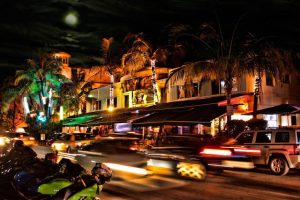Miami Beach is late with study on impact of alcohol ban referendum
Posted by Admin on Oct 17, 2017 | 0 commentsVoters in Miami Beach could change the character of the city’s most famous and celebrated street with a ban on outdoor alcohol sales after 2 a.m. if a referendum on the Nov. 7 ballot is passed.
But they have no information from the city about the impact of such a measure because a promised economic study has not materialized. A “preliminary report” is expected at Wednesday’s commission meeting with a final study due a week before the election is over — and after  thousands of people have voted via absentee ballots and early voting.
thousands of people have voted via absentee ballots and early voting.
Opponents, however, already have a counter study that says the ban would hurt the city financially, cost jobs and lower property values.
Championed to the point of obsession by Mayor Philip Levine — and one has to wonder why he is so hell bent on making this happen so fast (did someone shoot him down at The Clevelader once?) — the measure, which would change the last call only at outdoor bars from 5 a.m. to 2 a.m., is promoted as a tool for public safety in response to a shooting over a parking space on Memorial Day weekend.
But when commissioners voted unanimously in June to put this question on the ballot, they were basically promised an economic study on the impact by Sept. 1. And guess what? That didn’t happen.
There is no data to show the ban — which seems directly targeted at only three businesses in a 15-block strip — will curb violence. The city’s own statistics show that 911 calls for police and fire rescue in the Ocean Drive area peak between 11 p.m. and 2 a.m.  Those calls drop by about a third between 2 and 5 a.m.
Those calls drop by about a third between 2 and 5 a.m.
The Memorial Day weekend shooting that set this vote in motion happened at 10:35 p.m., by the way. Also, there have since been shootings on Lincoln Road, Collins Avenue and Española Way, where the mayor owns property.
So a 2 to 5 a.m. ban on just Ocean Drive seems selective and may have zero or at most a very minimal effect crime.
What’s worse is that, if passed, the measure could actually hurt the city financially, according to a study commissioned by the Florida Retail and Lodging Association, which represents businesses along Ocean Drive.
The 27-page report from Fishkind and Associates said that the three-hour change won’t help reduce crime but will have a “dramatic, negative impact on the economy of Miami Beach and significant consequences for the city’s budget.” It also puts the economy of Ocean Drive, where other businesses thrive off the popularity of the people-watching outdoor bars, “at risk to serious economic harm” not just to the three bars that would be affected, but to nearby restaurants and hotels that were surveyed and said the nightlife and hours on Ocean Drive are critical to the choice their guests make to stay here.
The city presented some faulty figures of their own — apparently pulled from thin air and presented in haste before any real, professional study could be done — that only look at Ocean Drive alcohol sales between 2 and 5 a.m. and not what the ban would do to other businesses or the perimeter zones.
“This ordinance will severely alter a formula that has proven successful and allowed hotels and restaurants to flourish,” said Carol  Dover, president and CEO of the FRLA. “If this destructive measure passes, jobs will be lost and taxpayers in the City of Miami Beach will be responsible for footing the bill for the millions of dollars in lost tax revenue.”
Dover, president and CEO of the FRLA. “If this destructive measure passes, jobs will be lost and taxpayers in the City of Miami Beach will be responsible for footing the bill for the millions of dollars in lost tax revenue.”
The numbers? More than $340 million a year in lost sales (bars + restaurants + hotels). Close to a $2 billion drop in property values. An estimated $20 million hit to the annual sales tax revenue. And 5,500 jobs lost.
City officials don’t have any real numbers to counter because it’s economic study just got started two weeks ago. Even though Levine told commissioners in June that he would get the study done by Sept. 1 so voters could be educated, the contract with Florida International University’s Office of Research and Economic Development wasn’t signed until almost a month after that on Sept. 29. And it gives the school 60 days to complete it.
It won’t take that long, said Amy Mehu, the city’s redevelopment specialist. “They are being expedient in data collection,” Mehu told Ladra Tuesday, adding that the city had trouble finding a firm to do the study. “Many firms stated conflicts of interests because they had done work for the hotel industry or businesses on Ocean Drive.”
Commissioners will get a preliminary report at Wednesday’s meeting and a final report will be available Oct. 31, Mehu said.
That means there’s a whole week for voters to get information before Election Day.
Well, again, except for the thousands of voters who will have already cast their ballots by mail — absentee ballots were mailed out Monday — and in early voting, which begins next week.
 “Talk about putting the cart before the horse,” said Commissioner Kristen Rosen Gonzalez.
“Talk about putting the cart before the horse,” said Commissioner Kristen Rosen Gonzalez.
She, too, is concerned with a rise in violent crime and the environment on Ocean Drive on a typical Friday night. But she says that the way to deal with that is with more police presence and community policing.
“This is not logical. If this was about logic, we would have commissioned a study before the vote,” Rosen Gonzalez said, adding that she will be voting no and telling her friends and supporters to do the same.



